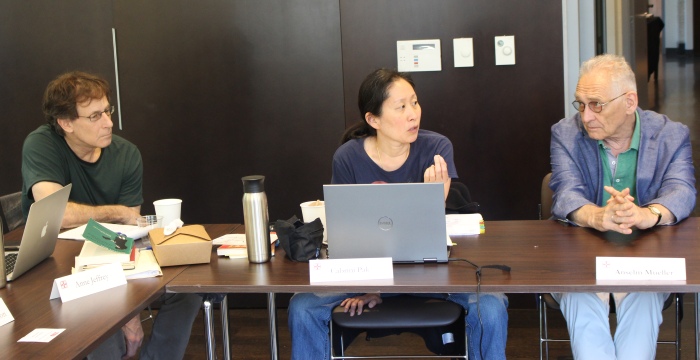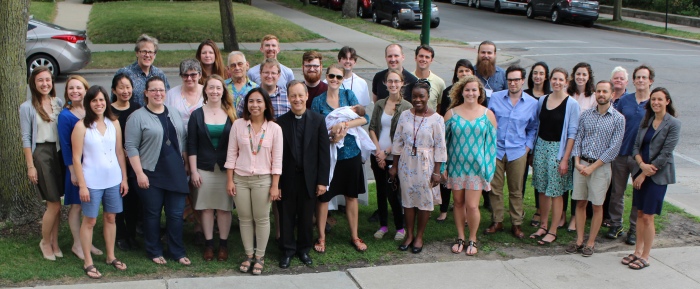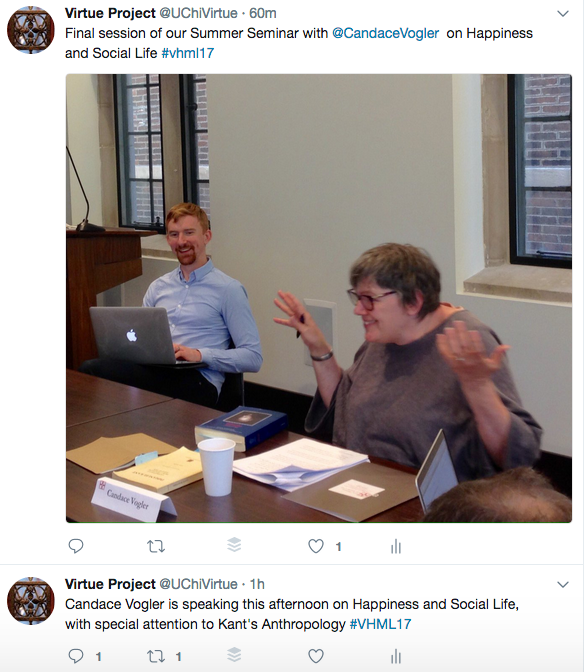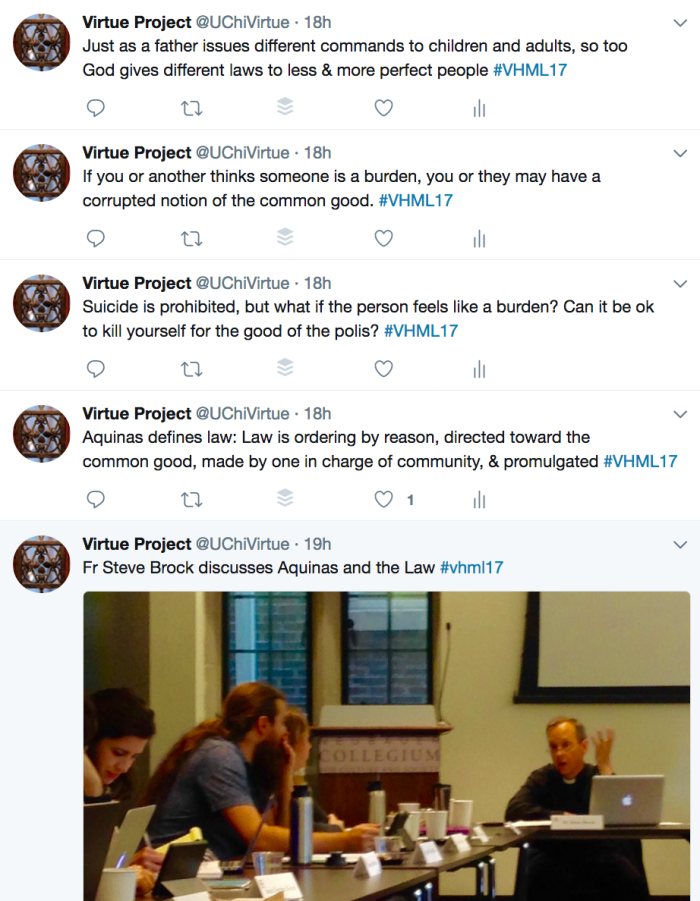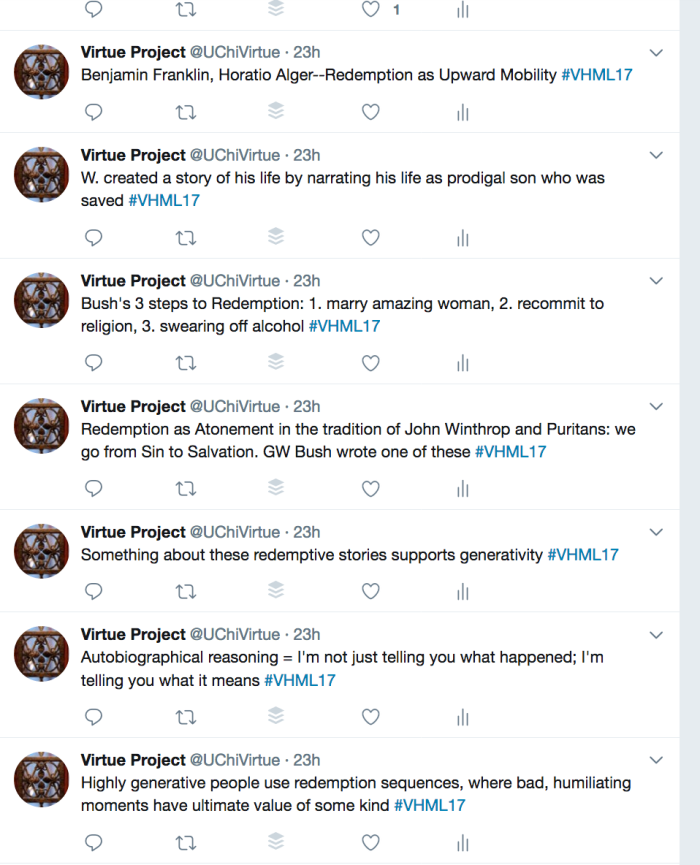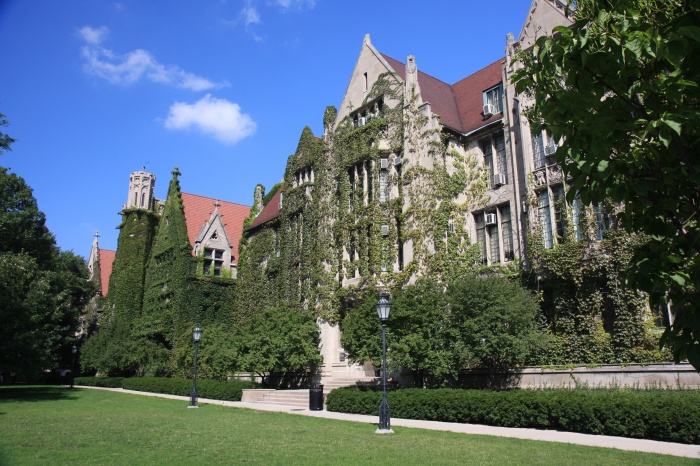One of the “big questions” of the Virtue, Happiness, and Meaning of Life (VHML) project at the University of Chicago asks whether self-transcendent orientation helps ordinary virtuous activity. In her 2015 blog post, Dr. Candace Vogler noted how, on the one hand, the terms virtue, happiness, and meaning of life appear in “broad, educated, popular culture,” but on the other hand, self-transcendence does not.
In a blog post earlier this year I introduced a conceptualization of transcendence as something native to the human experience. Beginning with a simple dictionary definition of the verb “transcend”: “a) to rise above or go beyond the limits of; b) to triumph over the negative or restrictive aspects of: to overcome,”[1] I went further to define transcendence as an experiential meaning-making process (Fig. 1) that helps a person form extraordinary connections both within and beyond the self with others, in time and space. A transcendent orientation, then, would be some natural part of our human construction. Transcendence as I have defined it can have an iterative quality, and if sufficiently repeated with personally relevant, extraordinarily positive or negative events, could reinforce or strengthen one’s transcendent orientation. I omit the “self-” prefix to transcendence because that aspect is included in my definition of transcendence above. The relationship between transcendent orientation and ordinary virtuous activity may then be explored in many ways. One possible approach, for example, would be to posit and test whether those with a sufficiently strong transcendent orientation will be more likely incorporate virtuous activities in one’s ordinary, day-to-day life, than those with a weak transcendent orientation.

In my dissertation, I defined transcendence as a process rather than as an event or state of being, making it potentially trackable. The process also has at least two possible outcomes: a) stabilization of one’s sense of self, allowing the person to more firmly root himself or herself in response to the question: “What am I?” and b) extraordinary connections within and beyond the self, giving the person coordinates within space-time, tagged with the memory of specific, meaningful events. These coordinates in moral space could then be referenced in future situations. My dissertation tracked transcendence, its inputs, and its outputs in resilient American service members who survived a POW experience and wrote about it later. It confirmed the presence of this process when they attempted to establish meaning with extraordinary, personally relevant, positive or negative experiences during their imprisonment.
Anti-transcendence, the contrary to transcendence, can also happen, in which attempts to make meaning of personally relevant, extraordinarily negative events fail. These kinds of events carry anti-transcendent markers, or those that would normally inhibit meaning-making from occurring. In the case of anti-transcendence, an unresolvable clash has occurred between the event and the person’s meaning-making apparatus, and the person is unable to surmount those anti-transcendent markers. Anti-transcendence only occurs when a person fails to attach proper meaning to a personally relevant and extraordinarily negative event. If the person fails to make meaning of a personally relevant, extraordinarily positive event, that memory eventually gets relegated to the realm of everyday events with no significant outcome. Such an event carries markers that would normally catalyze meaning-making, but a failure to establish meaning of such a positive event is unlikely to carry negative effects. This latter occurrence is not anti-transcendence; rather, the event simply exits meaning-making, perhaps to re-enter at a later time, or never again.
Anti-transcendence can result in one of two deleterious outcomes: a) destabilization of one’s sense of self and b) severing of extraordinary connections within and beyond the self. Anti-transcendence was detected in two of the Vietnam War POW memoirs I analyzed in my dissertation, both of which occurred shortly after their “breaking points” under torture. One service member experienced destabilization of his sense of self, describing that he was at the point of suicide and was reduced to an animal. The other experienced a sense of severing the extraordinary connection he had with his fellow POWs; he stated if he ever saw his fellow POWs, he wouldn’t be able to hold his head up, experiencing a profound sense of shame. He initially self-identified as a “failure” in this moment of anti-transcendence before entering a subsequent round of transcendence in which meaning was successfully established of his breaking point, with the help of his fellow POWs, and those extraordinary connections were reestablished.[2] I believe that a deeper study of both transcendence and anti-transcendence is necessary to inform the relationship between a transcendent orientation and ordinary virtuous activity. Transcendence may reinforce or strengthen that orientation, while anti-transcendence may diminish or disrupt it.
Recently, I had the opportunity to take a two-year assignment with a community of men who regularly ponder and discuss the big questions that The Virtue, Happiness, and Meaning of Life project has posited over the past two years. The Oblates of the Virgin Mary (OMV) is an international congregation of Roman Catholic priests and brothers, trained in giving the Spiritual Exercises of St. Ignatius and seasoned in the realm of spiritual discernment. They also understand openness to transcendence, which might be analogous to the idea of transcendent orientation, as native to human experience. Openness to transcendence as an inherent quality of the human person is taught as part of the social doctrine of the Catholic Church (paragraph #130).
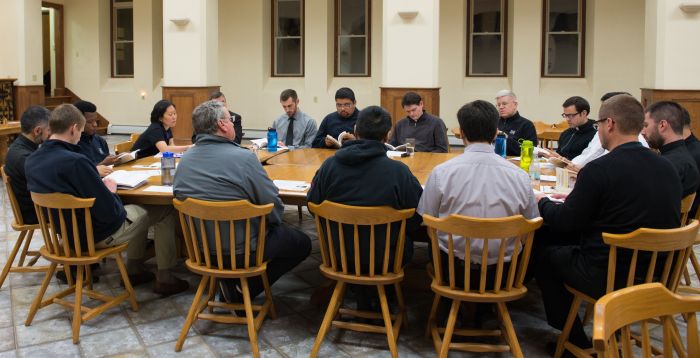
I sat down with sixteen of them one evening in their US-based seminary. These men hailed from such places as Nigeria, Brunei, the Philippines, Mexico, Canada, Minnesota, California, Florida, New York, Massachusetts, Illinois, and other parts of the United States. They came with equally diverse educational backgrounds, including tradesmen and those with undergraduate and/or advanced degrees in theology, history, physics, computer science, robotics, nursing, journalism, film, molecular biology, psychiatry, accounting/business, and more. We were gathered that day to discuss their founder’s writings, who thought deeply about and acted on the idea that there is an ultimate good worth striving for, which extends far beyond one’s own personal or immediate needs. Venerable Bruno Lanteri founded the OMV as a spiritual community over 200 years ago with a mission that was directed towards the ultimate good of others in the Piedmont region of Italy and the surrounding regions. It grew to serve thousands of people all over the world. Today the men of this community carry on that mission in Europe, the Philippines, Nigeria, the Amazon region in Brazil, Argentina, Canada, and the USA.
Although I did not plan or anticipate that this discussion would relate to the VHML project or transcendence, it turned out that the group chose to spend a significant portion of the evening talking about a potentially linked concept: spiritual joy. Spiritual joy is a topic preserved in the writings of their founder. It is an outcome of deep thinking about goods that go beyond one’s own comfort or immediate gratifications. This reflection is not meant to be an exhaustive academic treatment of the topic, but rather an account of the discussion that yielded some potentially useful concepts in the quest for a deeper understanding of transcendence.
Let’s begin with Ven. Bruno’s definition of spiritual joy:
“Spiritual joy is a joyous affection of heart produced through sufficient thought about present spiritual goods. What are these goods? Participation in the divine nature (as children of God), union with Jesus Christ, being in the bosom of the Church as her sons, God’s special protection, the gifts of the theological virtues, the sacraments, the communion of saints, grace, friendship with God, the merits of our actions, the glory of heaven that is already almost ours because of the firm hope we have…this is the joy that we must seek.” [The Spiritual Writings of Venerable Pio Bruno Lanteri: A Selection, pg. 91 – 92]
This joyous affection of the heart required the activity of “sufficient thought” on a subject, “present spiritual goods.” I asked these priests and seminarians to say more about how they understood this dynamic. One priest said, “At Mass, I think people can mistake joy for irreverence. Going to church should be enjoyable. It should be something that brings a smile to your face because you’re with your community, you’re with your brothers and sisters. I think that’s the way God intended it, and we in the modern world seem to be missing out on that spiritual joy that should be present.” A seminarian reflected on what attracted him to this congregation on his first visit: “Spiritual joy was one of the most memorable experiences I had on my visit. Being in community here for the first time gave me a sense of joy, ‘at home-ness,’ a place where I could be comfortable.” The sharing in joy was very attractive to him. Both men gave considerable thought to certain present spiritual goods that Lanteri mentioned, but these reflections weren’t made in a vacuum. Personally relevant, extraordinary events, like worship, or a “come-and-see” visit in the midst of vocational discernment were “inputs.” Both also noted the importance of a certain outcome: making extraordinary connections beyond oneself, perhaps the beginnings of solidarity.
They went further to say that spiritual joy can be contagious. When I asked how it gets spread, they responded that it can happen at the personal and the communal level. They said that it can be spread by how one authentically exudes spiritual joy in the public square, treating others with the kindness and gentleness that stems from one’s personal, close, relationship with Jesus. A community, if filled with the kind of focus on the spiritual goods that Lanteri mentioned, can also help spread that spiritual joy.
Curious about what opposes the “contagiousness” of spiritual joy, I also asked them how they think it is quenched in the world, since several of them cited its lack or absence in modern society. One seminarian mentioned that many people simply fail to recognize it when it happens. In other words, people may have experiences of spiritual joy, but because they do not know how to recognize it, they fail to make meaning of it, and it is soon forgotten. This would reflect a similar dynamic in my model of transcendence, when a person fails to make meaning of a personally relevant, extraordinarily positive event, and it gets relegated to the realm of everyday events. Another seminarian mentioned that people sometimes need to be reminded to ask the Lord for it, to actively seek it by pondering those present spiritual goods more deeply.
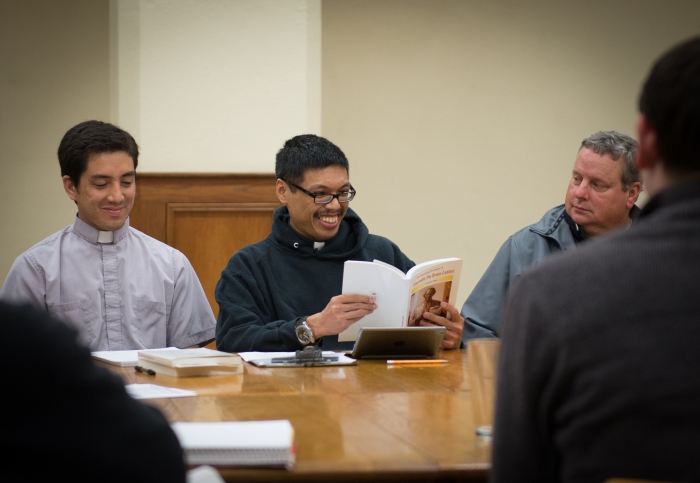
They also drew on their experience in discernment of spirits when discussing how spiritual joy may be quenched. These priests and brothers use St. Ignatius’ rules of discernment, which describe the actions of three sources of information on the discerner: God, the human discerner himself or herself, and the devil (also known as the enemy of human beings). This community is intensely trained in these rules and in giving the Spiritual Exercises, which incorporate those rules on retreat. I asked them what they thought were the top strategies of the enemy to quench spiritual joy in the modern world. The first response came from a senior priest. “Disruption of community life. If you disrupt community, you can disrupt everything.” Community could mean neighborhoods, parish communities, or religious communities. These were places where people live and work together on a day-to-day basis, calling for the practice of ordinary virtuous activity. One seminarian also noted how fomenting jealousy and taking offense where none was intended can also quench spiritual joy. Another seminarian noted that preventing sufficient thought about spiritual goods was a way to prevent spiritual joy from ever occurring, which could be caused either by oneself or by the work of the enemy. For example, in a later passage of Ven. Bruno’s writings, one could lose sight of spiritual joy by one’s own sloth, sins, or by tribulations and adversity. Alternatively, the devil could also work against a person’s concentration on present spiritual goods by offering temptations or distractions. The seminarian recalled a literary example of such a tactic in his reading of The Screwtape Letters by C.S. Lewis. The demon Screwtape recalls the danger of awakening a person’s reason, and tells the story of a “patient” he had, who was an atheist, and used to read in a museum. Rather than allow arguments to form in the mind of this reader, he suggested to his patient that it was just about time for lunch, knowing that getting him back into the street would prevent him from thinking further.
When discussing the antidotes to these diabolical tactics, one mentioned the needed presence of gentle, well-formed leaders with the proper training to help unify communities. A second mentioned the need to remind one another to seek and ask for spiritual joy from the Lord, in prayer, in spiritual direction, and by following the personal example of Jesus. A third recalled the importance of spreading good reading, the kind that encouraged the reader to keep pondering the present spiritual goods, and inspire him or her to do more for others.
Returning to one of the big questions of the Virtue, Happiness, and Meaning of Life project, is it possible that self-transcendent orientation may affect ordinary virtuous activity? Dr. Vogler sketched out manifestations of self-transcendence in her 2015 post that includes working on behalf of bettering the community in a way that helps strangers; engaging in spiritual practices that allow one to participate in a community organized by the need to be right with one another and to show due reverence for the sacred; and acting in small ways or big ways that are guided by one’s relation to something bigger and better than oneself.
There is a profundity to her question. Perhaps one way to the answer could involve more conceptual digging upstream. For example, is it possible that transcendent orientation is reinforced or weakened by how people handle personally relevant, extraordinarily positive or negative events, which in turn, has a downstream effect on the presence, absence, frequency, or intensity of ordinary virtuous activity? Can transcendence, defined as process rather than event or state of being, shed some light on these dimensions of transcendent orientation? Time will tell. I am grateful to have spent some time with such thoughtful scholars in the VHML project and look forward to hearing more about where the dialogue goes. Cheers!
Works Cited
Lewis, C.S. The Screwtape Letters with Screwtape Proposes a Toast. New York: Harper Collins, 1996.
Pak, Cabrini. “Transcendence in Resilient American POWs: A Narrative Analysis.” PhD diss., The Catholic University of America, 2017.
The Oblates of the Virgin Mary. The Spiritual Writings of Venerable Pio Bruno Lanteri: A Selection. Italy: Oblates of the Virgin Mary, 2001.
United States Conference of Catholic Bishops. “Openness to Transcendence and Uniqueness of the Person.” Compendium of the Social Doctrine of the Church. Washington, DC: USCCB Publishing, 2003.
Vogler, Candace. “Self-transcendence the missing link in research on virtue, happiness, and meaning in human life?” Oct. 22, 2015, The Virtue Blog, https://thevirtueblog.com/2015/10/22/self-transcendence-the-missing-link-in-research-on-virtue-happiness-and-meaning-in-human-life/, accessed Nov. 19, 2017.
[1] “Transcend,” Merriam-Webster dictionary website, accessed Mar. 4, 2017, https://www.merriam-webster.com/dictionary/transcend.
[2] Cabrini Pak, “Transcendence in Resilient American POWs: A Narrative Analysis” (PhD diss., The Catholic University of America, 2017): 161; 172 – 173.
[1] “Transcend,” Merriam-Webster dictionary website, accessed Mar. 4, 2017, https://www.merriam-webster.com/dictionary/transcend.




